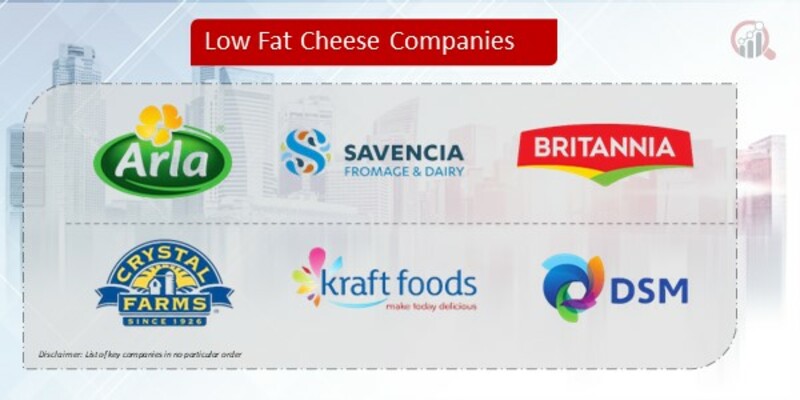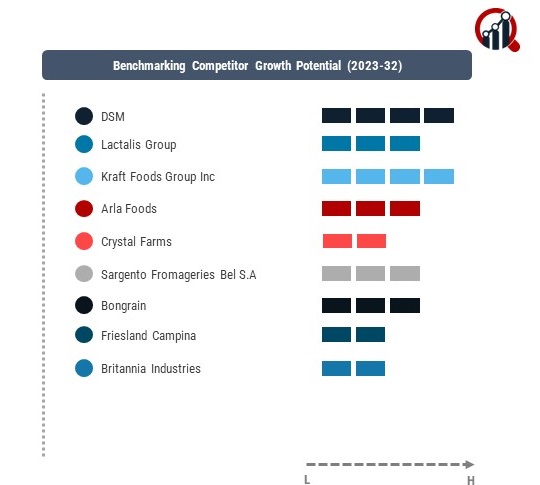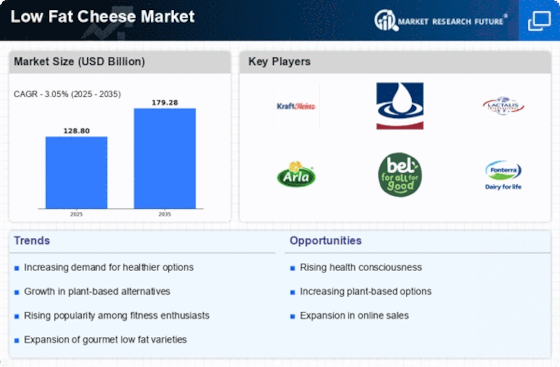Top Industry Leaders in the Low Fat Cheese Market

The competitive landscape within the Low Fat Cheese market is a dynamic arena marked by evolving consumer preferences, technological advancements, and a surge in health-consciousness globally. As dietary consciousness continues to rise, the demand for healthier alternatives, including low-fat cheese, has witnessed substantial growth. This segment of the market is dominated by several key players who continuously innovate their strategies to maintain their foothold and attract a broader consumer base.
Strategies Adopted
Strategies adopted by these key players revolve around product innovation and diversification, catering to specific dietary needs, and utilizing aggressive marketing campaigns to educate consumers about the benefits of low-fat cheese. Arla Foods, known for its focus on organic and natural products, has introduced low-fat variants that align with their brand ethos, appealing to a niche market segment seeking healthier alternatives.
Market Share Analysis
Factors contributing to market share analysis in the low-fat cheese industry encompass diverse elements. Product quality, pricing strategies, distribution channels, brand recognition, and consumer loyalty play pivotal roles in determining a company's market share. Additionally, consumer perception regarding taste, texture, and nutritional value significantly influences purchasing decisions, prompting companies to invest in research and development to enhance product offerings.
Emerging Companies
Amidst the established players, new and emerging companies are making headway into the low-fat cheese market, introducing innovative products and disrupting traditional market dynamics. Start-ups and smaller enterprises, such as Farmhouse Culture, Sheese, and Good Culture, are gaining traction by focusing on niche market segments, offering unique flavors, and employing sustainable production practices. These companies aim to capitalize on the growing demand for organic and plant-based low-fat cheese alternatives, challenging established norms and expanding the market landscape.
Industry news and current trends suggest a shift towards plant-based and lactose-free low-fat cheese options driven by the increasing adoption of vegan and dairy-free diets. Companies are investing in research and development to create innovative formulations that replicate the taste and texture of conventional cheese while catering to specific dietary preferences. Furthermore, technological advancements in food processing and manufacturing techniques are enabling companies to improve the nutritional profile of low-fat cheese without compromising taste or quality.
In terms of investment trends, companies within the low-fat cheese market are actively seeking strategic collaborations, acquisitions, and partnerships to strengthen their market position and broaden their product portfolios. Investments are channeled towards expanding production capabilities, enhancing distribution networks, and capitalizing on emerging consumer trends. Additionally, there is a growing emphasis on sustainability, with companies investing in eco-friendly packaging and adopting environmentally conscious practices throughout the production and supply chain.
The overall competitive scenario in the low-fat cheese market is characterized by intense rivalry, innovation-driven strategies, and a constant quest to cater to evolving consumer preferences. Market leaders are vigilant in monitoring consumer trends and swiftly adapting their offerings to maintain their competitive edge. The industry's future trajectory is likely to witness continued innovation, diversification, and a shift towards healthier, more sustainable low-fat cheese options to meet the demands of an increasingly health-conscious consumer base.
Recent News:
Weight Watchers International hold significant market share. These industry giants have established their positions through a combination of product innovation, strategic partnerships, and extensive distribution networks. Kraft Heinz, for instance, has leveraged its brand reputation and diversified product portfolio to cater to the low-fat cheese segment, providing a range of options for health-conscious consumers.
Key Companies in the Low-Fat Cheese Market include
- DSM (Netherlands)
- Lactails Group (France)
- Britania Industries (India)
- Kraft Foods Group Inc (US)
- Crystal Farms (US)
- Bongrain (France)
- Arla Foods (Denmark)
- Friesland Campina (Netherlands)












